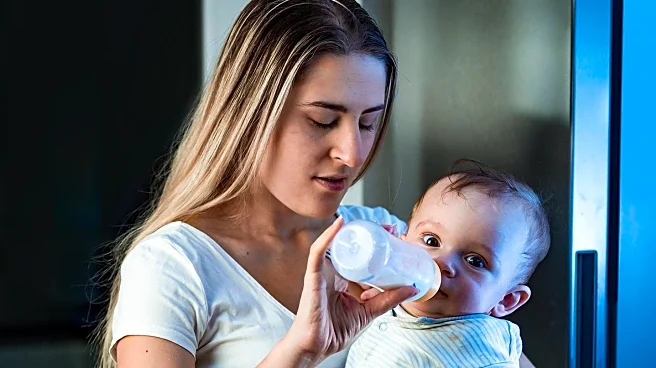What's Happening?
A recent study conducted by Katherine Travis and her team at Weill Cornell Medicine in New York has revealed that playing recordings of a mother's voice to premature babies can accelerate brain maturation, potentially improving language outcomes. The study involved 46 premature infants, born between 24 and 31 weeks of gestation, in neonatal intensive care. Mothers recorded themselves reading from the children's book 'A Bear Called Paddington,' and these recordings were played to half of the babies twice every hour from 10pm to 6am, increasing their exposure to their mother's voice by an average of 2.7 hours daily until their original due date. MRI scans showed that babies exposed to their mother's voice had more organized brain connections in the left arcuate fasciculus, a key area for language processing.
Why It's Important?
The findings of this study are significant as they suggest a simple intervention that could be integrated into neonatal care to support the development of premature infants. Premature birth is often associated with altered brain structures, leading to language difficulties and potentially affecting communication and academic achievement later in life. By enhancing brain connectivity through exposure to a mother's voice, this approach could mitigate some of these developmental challenges. The study highlights the importance of early auditory experiences in shaping brain development, offering a potential strategy to improve long-term language and communication skills in premature babies.
What's Next?
The research team plans to conduct larger trials to confirm these findings and explore the effects on more medically fragile infants. They also aim to follow the current participants to assess whether the observed brain differences translate into tangible improvements in language and communication skills as the children grow. Additionally, the team intends to investigate whether speech from other caregivers could provide similar benefits, given the importance of variability in speech for language development.
Beyond the Headlines
This study raises questions about the unique impact of a mother's voice compared to other voices, given its familiarity and biological significance to infants. While the study did not address this directly, previous research suggests that continuous exposure to a mother's voice in the womb may explain infants' preference for it after birth. The potential for other caregivers' voices to offer similar benefits will be explored in future studies, emphasizing the broader implications for neonatal care practices.


![Daily Slop: 12 Feb 26 – New Commanders OC David Blough: “How do we get Terry [McLaurin] 10 targets a game?“](https://glance-mob.glance-cdn.com/public/cardpress/binge-magazine-card-generation/spaces/US/en/sb-nation/images/ppid_2cf3d240-image-177091266842313096.webp)






